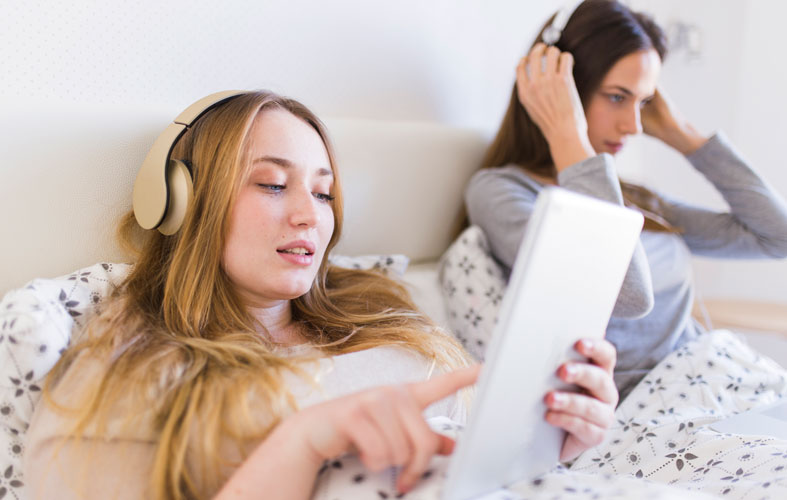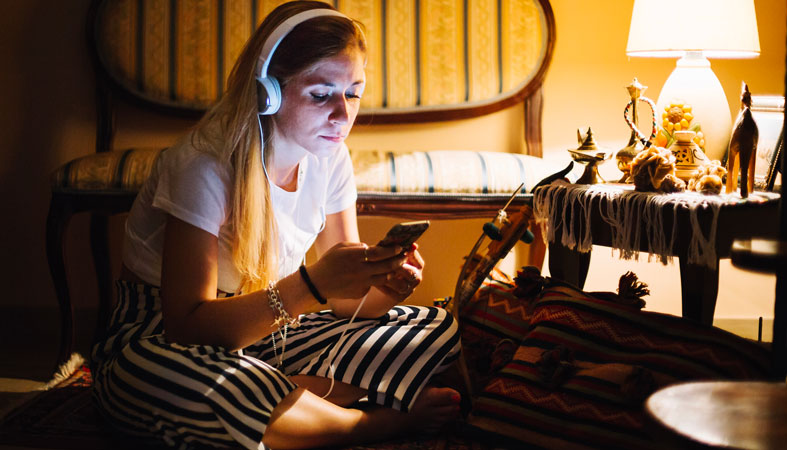If you have trouble falling asleep at night, you’ve probably tried just about everything.
But what if just putting on your favorite album could help you fall asleep and get better rest at night? Could it be that simple?
Music affects our brain in a variety of ways, nearly all of them positive. It makes sense then that it could also help us sleep.
In this article, we explore the effects of listening to music while sleeping, and we’ll even shed some light on what the dangers are.
How Does Music Affect Us?
Our brains are wired to respond to music. And since our brain sends signals to every part of our body, music can affect us in a variety of ways. On a physiological level, our breathing and heart rate will mirror the beat of a song.
Different types of songs can also alter our body chemistry and hormone levels. For example, listening to pleasant tunes can boost serotonin levels, which makes us happy. The thing is that “pleasant” is a subjective term, and so the same song can affect each of us differently.
Listening to music activates both sides our brain, the left, and the right. Engaging both sides of your brain simultaneously boosts your ability to solve problems because you’re using the creative left side of your brain at the same time as the logical right side.
Music also triggers the hippocampus, which is the part of your brain that’s associated with long-term memory storage. That’s why songs from the past can trigger memories, and why many of us feel nostalgic when we hear songs from our childhood, adolescence, or peak times in our life. The song is helping to bring back fond and pleasant memories.
Overall, music has a positive effect on us, with one notable exception. Loud noise (over 95 decibels) can negatively affect our judgment. So, if you’re in the midst of an important decision, turn down the volume to a reasonable level.
Why Listen to Music While Sleeping
Boosts Sleep Quality & Quantity
As long as you’re choosing songs that make you feel relaxed and happy, falling asleep to a pleasant song can help you fall asleep faster and get better rest. It’s similar to when we were children, and our parents sang us lullabies to “lull” us to sleep.
If listening to background noise becomes a part of your nightly routine, the positive effects can multiply. Not only will the melody help soothe and relax you, but the routinized aspect of playing songs right before bed will signal your body that it’s time to rest. You may find yourself able to fall asleep effortlessly, simply because you’ve trained your body that it’s time to go to bed.
Relaxation
Music can help us relax, especially if the song is in the sweet spot of 60 to 80 BPMs (beats per minute). This most closely matches our resting heart rate and therefore is soothing on a biological level.
We’re all different, however. That’s what makes humans such delightful creatures. What one person deems as relaxing, someone else could find grating. For example, you might like classical music, and your spouse could be a death metal aficionado. Whereas you’d dream blissfully listening to Tchaikovsky, your spouse would prefer Metallica’s greatest hits.
To sum up, music to your ears isn’t likely to match up with someone else’s definition of relaxing.
Fall Asleep Faster
By the end of the day, we’ve got about a million thoughts running through our minds. The inconsiderate person who cut us off on the freeway, the dishes left unwashed in the sink, the annoying comment Susan said in the meeting, our to-do list for tomorrow… all of these thoughts are battling for our attention, which takes up space in our brain and keeps us awake.
Putting on some background tunes can take our minds off our daily distractions and give our brains something else to focus on. Try putting on music as you lie down in bed at the end of a stressful day. You may find that you fall asleep much faster!
Trigger Feel Good Chemicals
Music that we enjoy stimulates serotonin production, the happy, “feel good” chemical in our brain. People who are depressed are deficient in serotonin, so it makes sense that if we want to happy we should do what we can to boost our serotonin levels naturally.
It’s a lot easier to fall asleep and stay asleep when you’re in a happy mood, so put on your favorite album and see what kind of effect it has.
Dangers of Sleeping with Earbuds
Necrosis
Earbuds can be uncomfortable to sleep in, especially if you lie on your side, but there some hidden dangers, too. The most disgusting one is necrosis, which is when your body’s tissue dies due to lack of blood flow. In theory, the pressure your earbuds put on your ears over time could cut off circulation and lead to necrosis.
This is a longshot and would probably take time to happen. Just keep an eye on your ears, and you’ll probably be fine. If you’re concerned, ask your doctor since we’re not trained medical professionals and can’t be held responsible if in fact, your ear tissue dies from prolonged earbud use.
Wax Build Up
Our ears are continuously creating wax, which helps protect the ear canal and keep it clear of foreign objects. However, when it builds up, it can do just the opposite. It can clog our ears, too. Too much wax buildup affects our hearing, and it’s an ordeal to clear it out.
Prolonged earbud use can lead to wax buildup because the earbuds block wax’s exit point. Take a look at your current earbuds. If you see a ton of wax inside of them, you may have too much of this substance in your ears as well.
Strangulation
If you die of strangulation from wearing earbuds while you sleep, you are the deserving winner of a Darwin award. Yes, there’s strangulation risk if you sleep with a cord near your head, but it’s incredibly remote unless you’ve got a poltergeist living with you.
For those who are overly concerned, try wireless, Bluetooth earbuds or pillow speakers, which we’ll outline now.
Other Alternatives
Radio
If you’re a solo sleeper or your partner is extremely tolerant, you might want to listen to the radio as you drift off to your dreamland. Those alarm clock radios that were common in the 90s are particularly useful because of the “snooze” feature. You could set a timer, and the music would turn off after a specified period.
More modern devices also have this feature, though the name of the button will vary depending on your specific equipment.
Special Headphones
Earlier we mentioned wireless headphones to reduce the already unlikely risk of strangulation. Another option is earbuds that are embedded into a headband, aptly called headband headphones. These have built-in earbuds that are enclosed inside of a headband.
The sound quality isn’t quite as good as earbuds directly in your ear, but if you sleep on your side, you’ll find these infinitely more comfortable.
Check Out Our Full Guide: Best Headphones for Sleeping
Frequently Asked Questions
Can music help people with insomnia?
Yes, absolutely! It helps in a variety of ways. First, it can help slow down your heart rate and breathing if you choose songs that are slower and soothing. Second, it can distract you from the troubles of the day. And third, if you listen to music every night, it can become part of your nightly routine. Having a set routine each night signals your body that it’s bedtime, helping you fall asleep faster and remain in a restful state longer.
What types of songs are best for sleeping?
Ideally, you want songs that most closely mimic your heart rate. Look for songs in the 60 to 80 beats per minute (BPM) range. If you’re not sure how many BPMs a song has, you can look up virtually any song at songbpm.com.
Experiment and feel free to try more upbeat songs as well. Some people prefer to fall asleep to fast tempo beats, while others find classical music to be the best. We’re all different, so please feel free to explore and do what works best for you.
Read Our Full Guide: Best Sleep Music
Does it affect your dreams?
Anything in our external environment can potentially affect our dreams. You’ve probably had dreams where you heard the phone ringing, only to wake up to hear that the phone actually is ringing. The same principle applies to music. According to researchers, if there is a song playing in the room where you’re dreaming, you’re more likely to hear music in your dreams.
Conclusion
If you’ve had a long day and you’re having trouble winding down, put on a happy tune. It’ll probably help you relax and fall asleep. At the very least, it’ll put you in a better mood.
Sources and References:
- Sleep & Music – sleep.org
- Music improves sleep quality in students. – ncbi.nlm.nih.gov

Jill Zwarensteyn
Editor
About Author
Jill Zwarensteyn is the Editor for Sleep Advisor and a Certified Sleep Science Coach. She is enthusiastic about providing helpful and engaging information on all things sleep and wellness.
Combination Sleeper



